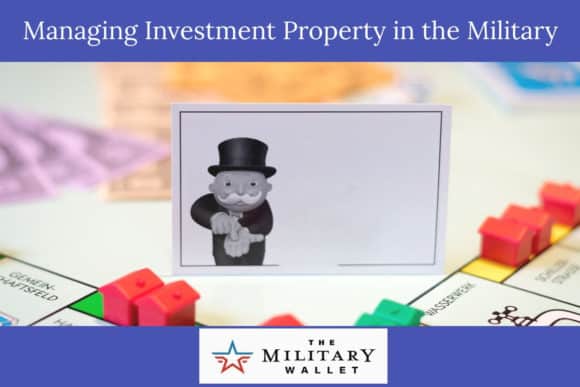Dealing with tenants can be an unnecessarily stressful endeavor if you aren’t prepared for it. I have heard countless military landlord horror stories, as I’m sure you have too.
Fear not, there are many more successful landlord experiences than there are failures—you just don’t hear about them as often because nobody runs to Facebook to post, “My tenants paid their rent this month, and everything is going according to plan!”
As with everything in life, there is a right way, and a wrong way to go about managing investment properties while in the military. Taking a little time to prepare can make all the difference, and here are some tricks I’ve learned over the last five years as a military real estate investor!
Received PCS Orders and Don’t Know What to Do with Your House?
One of the most common reasons service members become landlords is because they received PCS orders and didn’t know what else to do with their home.
They weren’t spending months preparing to become a landlord, and they were probably thrust into the position without ample time to prepare.
While unfortunate, this is the reality for a lot of military families during PCS season.
Luckily, you have options!
Before we dive into property management, I want to help you confirm whether you should sell the home or rent it out when you move. There are a few simple questions that I use to help frame this decision, and I’m sure this will help you make the right decision as well!
Lean Towards Renting if…
- You will be able to cash flow after accounting for all expenses: mortgage, taxes, insurance, repairs/maintenance, capital expenditures (things like water heaters, roof repairs, etc.), and vacancy
- You intend to live in that home, or town, again in the future
- You would like to buy other rental properties in that market
- Or if you would like to live/visit that town again in the future
Lean Towards Selling if…
- You will have to pay money every month to hold onto the home
- You have a significant amount of equity in the home, and could put it to better use elsewhere (preferably reinvesting, and not buying consumer goods)
- You have no interest in living in that house, or town, ever again
- You don’t want to own any more rental properties in that market – for example, if it is very tenant-friendly, and you don’t want to mess with it
- You can’t find a solid property manager and don’t want to self-manage
- If owning a house is going to stress you out a ton
There are a ton of “if this, then that” ways to consider whether to sell your home, or rent it, when you PCS.
I generally tell people that the way I consider this is simple. If you will legitimately cash flow—meaning the home is paying you to hold onto it, after all of the expenses are accounted for—then it probably makes sense to hold onto the home for the long-term.
That is unless you have no intentions of ever living there again, owning other rentals there, or can’t find a good property manager.
If, on the other hand, you have a lot of equity in the home, it probably makes sense to cash out—unless rental properties fit into your investment portfolio—and reinvest that capital into the investment strategy you prefer.
Keep in mind, that if you occupied the home for 24 monthly (cumulatively) out of the last five years—15-years if you’re still active duty—you will not have to pay capital gains tax on the sale of the home. Here is more information on capital gains rules for military families.
Self-Manage or Hire A Property Manager?
Many service members choose to self-manage their rental property when they PCS. While you might save a little money self-managing, there are definitely benefits to hiring a professional property management company as well.
Ultimately, this decision could probably be boiled down to one thing, your personality.
Some people have the perfect personality for signing lease agreements, managing tenants, handling maintenance on the property, and everything else that coincides with property management. I have a friend who manages his own rental properties in both North Carolina and California, and he does it extremely well.
Other people—like myself—would rather pull their hair out than deal with managing their own rentals.
I do not have the personality to deal with the details required for property management. Nor would I handle whiny tenants very well. For me, it is 100% worth hiring a property manager.
Tips for Self-Managing
I recruited the help of the friend I mentioned above in order to ensure this was the best information for self-managing your rental property. Dave manages properties in several markets and has never had a unit vacant for more than two weeks! He is, by far, the best at self-managing investment properties that I have ever seen!
Some things to keep in mind when self-managing.
1. Gaining Interest In Your Property
The best thing you can do when managing your own property to fill vacancies fast. However, filling a vacancy starts with generating interest.
- Marketing: Mass market your properties across platforms like Zillow, Trulia, Hot Pads, Realtor, Facebook Marketplace, Craigslist, Instagram, and word of mouth.
- Photos for your listing: Get professional photos done. If you can afford to have the property staged, do that too. Finally, organize the photos in a way that flows as you would walk through the home.
- Descriptive listing: Make sure the description of your home is very detailed. This will cut down on many of the common questions which will get asked over and over.
- Responsiveness: Keep in mind, yours is not the only property the applicant is researching. Responsiveness is key. Do NOT put off answering questions via text or phone call.
2. Once You Have Interested Applicants, They Enter The “Pipeline”
This is where you handle the applications, walkthroughs, leases, and payments.
- Application: Most applicants are going to want to walk through the property before filling out an application. Never allow this. Why would you allow someone to walk through your property when they might not even be a qualified tenant?
- Walkthrough: After their application has been accepted, schedule a walkthrough. This is when you will enlist the help of your “person on the ground” (see step 4).
- Lease and payment: At this point, you will send the lease to the applicant to sign and send back. Ensure your lease will hold up as a legal document. Seek assistance from an attorney if you do not already have a lease. For payments, you want to at least collect the first month’s rent and a security deposit. Usually, the security deposit is equal to one month’s rent. Also, ensure that whatever method you decide to use to collect rent is communicated clearly with the tenants.
3. Move-In Time!
Now that you have found your ideal tenant, it is time for them to move in.
- “Welcome home” letter: A good idea is to have a “welcoming” letter of sorts, e-mailed to your tenants before they move in. You want this letter to include things like the nearest schools, supermarkets, amenities, all the phone numbers to the utility companies, and any specific requirements the companies need in order to start service.
- Move in/ Move out form: Within 10-14 days of occupying the property, your tenant needs to go a full walkthrough of the property and send the move in/ move out form to you. Your “person on the ground” will use this form when the tenants move out to see what repairs they’ll be responsible for.
- Maintenance: During the time you live in your property (before renting), you should build a network of maintenance personnel. You can then call these individuals when you get a call about a maintenance issue. You can always ask for recommendations from other landlords in the area for good maintenance people too!
4. Your Person On The Ground
Although you can 99% effectively manage a property from afar, there are some things that need to be done in person such as conducting the initial walkthrough with applicants when they move in and conducting a final walkthrough when tenants move out.
I recommend that you have a couple of people local to the rental property that you trust to carry out these tasks.
When conducting walkthroughs with applicants, they should know enough about your property to field questions about it. Similarly, when conducting the final walkthrough, they should have the move-in / move-out form in hand and have a good eye for spotting damage.
Tips for Hiring A Property Manager
The most beneficial way to find a solid property manager is to ask for recommendations. This could involve asking a friend who they are using, or finding a real estate investor in your area and asking them. If they are currently using a property manager—and they like them enough to recommend them—that is a good place to begin your search.
Next, I would recommend that you interview at least three property managers. You can do this on the phone, or in their office, but regardless I recommend that you ask them for a copy of the agreement you would be signing to work with them. Take this agreement home, and you can compare the agreements from all three companies.
There are a whole slew of things to look out for when hiring a property manager. Here is more information on screening and hiring property managers.
Here are the most important questions to ask property managers during your interview:
- What is your experience as a property manager? (years, asset-class, current portfolio, etc.)
- What licenses, and/or qualifications do you have?
- Make sure they are compensated as X% of gross rents received. They shouldn’t be compensated while the unit is vacant, as you want them to be motivated to lease your home. Ask about every fee they have, and make sure you understand them.
- Ask about their track-record for vacancy rate, turnover times, evictions, etc. You want to have an idea of what you’re getting into in the market if things don’t go according to plan for a tenant. You want to expect the best, but plan for the worst.
- Ask them for references.
- Ask for a copy of the agreement you’re going to sign with them so you can take it home and review it.
I recently came to the conclusion that a property manager’s personality plays a big role in their success rate too. In my experience, and speaking with other investors, the best property managers are a little rough around the edges. You don’t necessarily want the super shiny, well-oiled machine, with the smooth-talking front-runner as your management team. You want a team that isn’t afraid to get dirty or be firm when tenants start getting out of hand.
Ask each property manager for a few references that you can call. This should be understood, but you owe it to yourself to actually call the 2-3 references they gave you, and see how the other property owners feel about their manager.
At this point, I own over 20 rental units, and spend less than an hour a month dealing with them (most of the time) because I hired a solid property manager!
The Bottom Line About Managing Your Investment Properties On Active Duty
The chances are pretty good that as you read through this you were able to quickly realize whether you have the capacity to manage your own property, or (like me) would be better suited to hire a property manager.
Now that you know whether to sell, or rent, your home—and have decided how to manage it—I’m confident that you’ll be able to successfully navigate this aspect of your PCS.
You might even find that you enjoy being a landlord, and the wealth-building opportunities that real estate provides. When that day comes, know that you are not alone. There is a vast community of military real estate investors, and we are here to help!
If you want to read an awesome book about managing your own rental properties check out The Book On Managing Rental Properties by Brandon and Heather Turner.




About the comments on this site:
These responses are not provided or commissioned by the bank advertiser. Responses have not been reviewed, approved or otherwise endorsed by the bank advertiser. It is not the bank advertiser’s responsibility to ensure all posts and/or questions are answered.